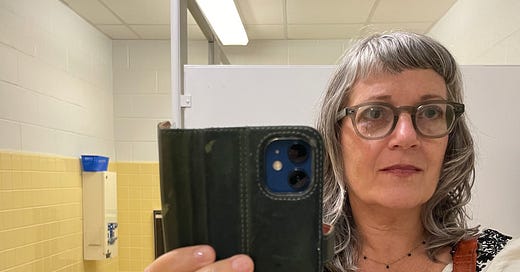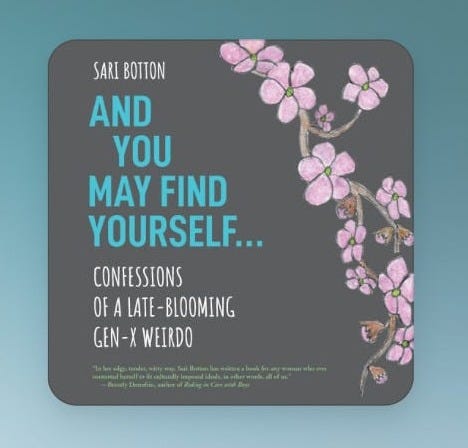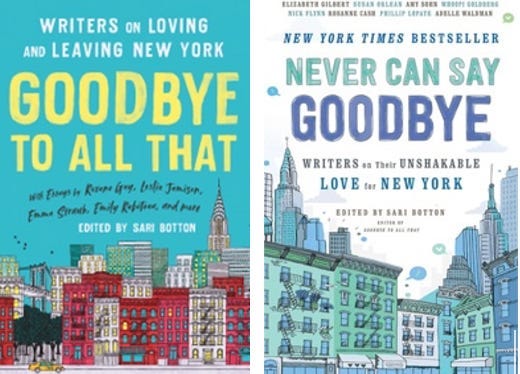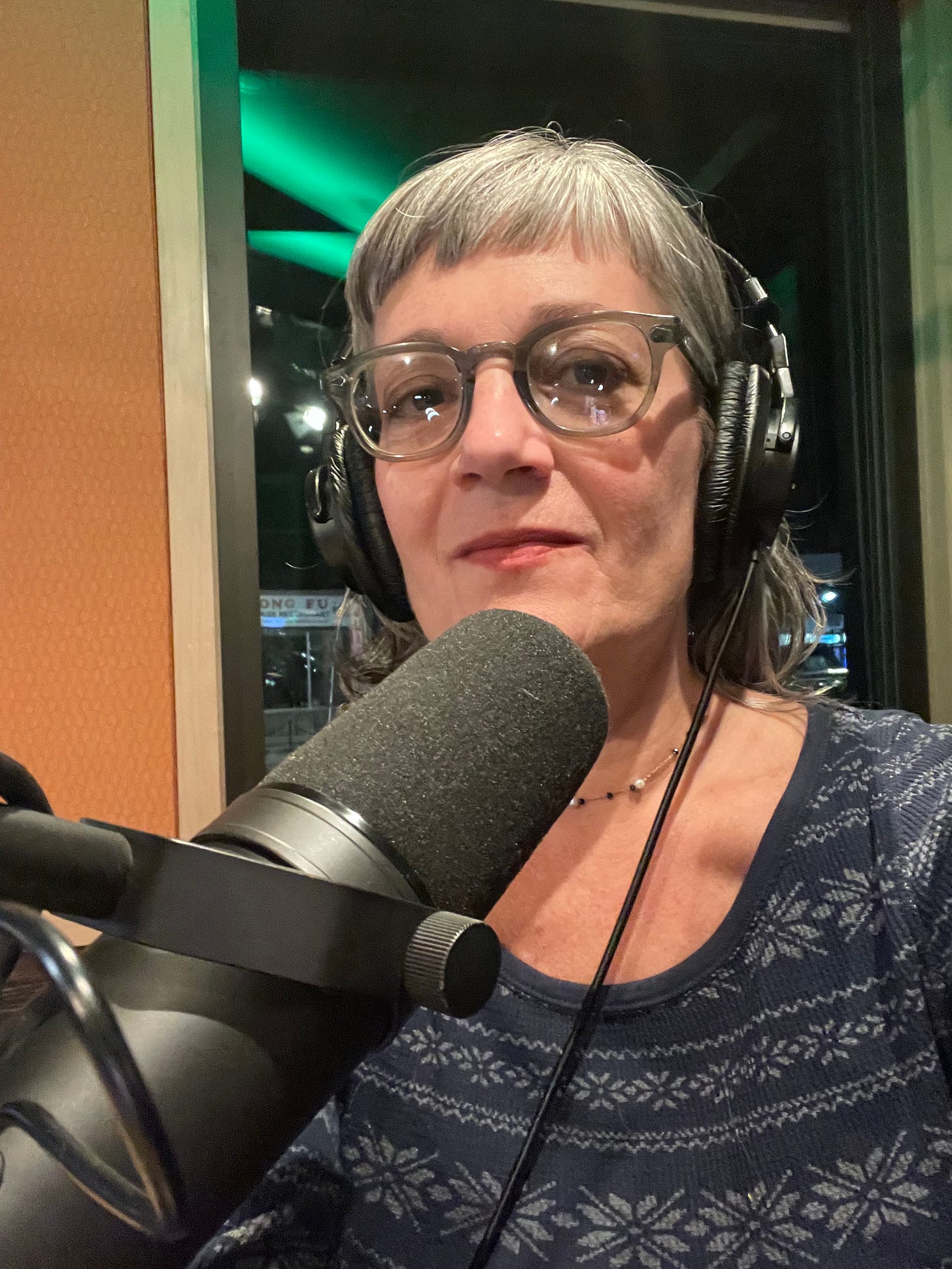The Memoir Land Author Questionnaire #100: Me (Sari Botton)
"I first started writing as a kid as a way to try and figure out why I felt different from others around me."
Since 2010, in various publications, I’ve interviewed authors—mostly memoirists—about aspects of writing and publishing. Initially I did this for my own edification, as someone who was struggling to find the courage and support to write and publish my memoir. I’m still curious about other authors’ experiences, and I know many of you are, too. So, inspired by the popularity of The Oldster Magazine Questionnaire, I’ve launched The Memoir Land Author Questionnaire.
Here’s the 100th installment, featuring…me. Aka , author of the memoir-in-essays And You May Find Yourself…Confessions of a Late-Blooming Gen X Weirdo, newly out in audiobook format. (When the questionnaire scheduled for today fell through, I had to snag the 100th slot for myself.) -Sari Botton
P.S. Check out all the interviews in The Memoir Land Author Questionnaire series.
Sari Botton's memoir in essays, And You May Find Yourself...Confessions of a Late-Blooming Gen-X Weirdo, was chosen by Poets & Writers magazine for the 2022 edition of its annual "5 Over 50" feature. An essay from it received notable mention in The Best American Essays 2023, edited by Vivian Gornick. For five years, she was the Essays Editor at Longreads. She edited the bestselling anthologies Goodbye to All That: Writers on Loving and Leaving NewYork and Never Can Say Goodbye: Writers on Their Unshakable Love for New York. She publishes Oldster Magazine, Memoir Land, and Adventures in Journalism. She was the Writer in Residence in the creative writing department at SUNY New Paltz for Spring, 2023. She could use more support for all she publishes here , in the form of paid subscriptions.
—
How old are you, and for how long have you been writing?
I’m 59 and I’ve been writing since I was a little kid, professionally since college.
What’s the title of your latest book, and when was it published?
And You May Find Yourself…Confessions of a Late-Blooming Gen-X Weirdo was published by Heliotrope Books in June, 2022. The audiobook edition was released in early February, 2025.
What number book is this for you?
Four. Previously I’d published three anthologies, including the New York Times bestselling Goodbye to All That: Writers on Loving & Leaving NY, and Never Can Say Goodbye: Writers on Their Unshakable Love for NY. I’m also a New York Times bestselling ghostwriter of memoirs.
How do you categorize your book—as a memoir, memoir-in-essays, essay collection, creative nonfiction, graphic memoir, autofiction—and why?
Technically it’s categorized as a memoir-in-essays, but I refer to it in the book as a “memoir-in-confessions” because I feel as if not all the pieces are true personal essays, with arguments or clear take-aways. Although, I think the book as a whole has arguments and clear take-aways. I should probably save myself some breath and just go with “memoir-in-essays.”
What is the “elevator pitch” for your book?
“And You May Find Yourself... by Gen-X author Sari Botton, is a mid-life coming-of-age memoir about ‘finding’ yourself later in life, after first getting lost in all the wrong places. As Botton discovers, the wrong places famously include her own self-suppression and misguided efforts to please others. In a series of candid, reflective, sometimes humorous essays, Botton describes coming to feminism and self-awareness as an older person, getting second (and third and fourth) chances—and how maybe it's never too late to find your way, assuming you're lucky enough to live long.”
Technically And You May Find Yourself… is categorized as a memoir-in-essays, but I refer to it in the book as a “memoir-in-confessions” because I feel as if not all the pieces are true personal essays, with arguments or clear take-aways. Although, I think the book as a whole has arguments and clear take-aways. I should probably save myself some breath and just go with memoir-in-essays.
What’s the back story of this book including your origin story as a writer? How did you become a writer, and how did this book come to be?
It took me more than fifteen years to get out of my own way and produce 2/3 of this this memoir. (The other third is pieces that were previously published, which I reworked for the book.)
In the aughts, I’d published some essays that upset people in my life, and I was struggling to figure out what was the best way to tell my story without upsetting others, or revealing things about them that they might prefer I didn’t. To that end, I wrote a column for The Rumpus called “Conversations with Writers Braver than Me,” for which I interviewed memoirists about how they handled all that. Interestingly, everyone I interviewed had a different approach. It was very enlightening and comforting, and it helped me find memoir community.
I first started writing as a kid as a way to try and figure out why I felt slightly different from others around me. I felt like a Martian taking anthropological field notes on Earthlings, to report back to the home planet.
Recently I was diagnosed as Level 1 on the autism spectrum, which I think explains some of this. I got diagnosed after some autistic readers wrote to me and asked whether I’d ever been tested, because they saw possible evidence of autism in what I’d written. (I’d also been wondering about this for years.) As I was recording the audio version of my memoir last fall, shortly after getting diagnosed, I could see what they were saying.
I liked to act as a kid, and started writing plays when I was 10 or 11, thinking of it as writing my own material. I continued focusing on playwriting in college. But I also inadvertently started my career as a journalist then, and that sort of indirectly led me in the direction of personal essays: an internship writing travel pieces for the I ❤️ NY campaign through the New York State Department of Commerce might have been the very first seed of Goodbye to All That.
The next year, my dad and my then boyfriend suggested I apply for the Newsday/New York Newsday internship for aspiring journalists, and I snobbily responded, “I’m sorry, I’m a playwright…” But then they persuaded me to fill out the application, and somehow I was chosen. I spent that summer on the arts desk, writing two short features a week, and I was hooked.
After college, I got waylaid in trade journalism for nine years, but worked myself out of it by freelancing on the side for The New York Times, women’s magazines, Billboard, Rolling Stone, MTV News and other outlets. In that time fell in love with memoir and personal essays, which I began working on and publishing in 1992, and editing and teaching in the aughts. I deeply immersed myself in the world of memoir and personal essays, and have been on that path ever since, including publishing two Modern Love essays in The New York Times Style section, and the work I do here in Memoir Land, and at Oldster Magazine.
What were the hardest aspects of writing this book and getting it published?
As I mentioned above, I first had to figure out a way to write about other people that didn’t blow up their lives, or piss them off.
I was also writing it in the first years of the pandemic, and with so many people dying and suffering in so many ways, I struggled to get over my sense that my unexceptional story wasn’t worth telling. I had to keep reminding myself of all the times I’d published personal essays and readers emailed me gratefully afterward, saying I’d told a version of their story they been unable able to express, or even fully understand, until I published what I did. I also kept reminding myself that the meat and potatoes of the memoir category isn’t exceptional stories, it’s good writers illuminating the common and mundane.
I had a hard time finding a book deal. I was up against many difficult factors, some of which I won’t mention because publishing is a small world, and I’d prefer not to burn bridges. I wound up at tiny, indie Heliotrope Books, based in my beloved East Village, with a very small book deal. It was a good place for me to land for many reasons, including that with such a small press, I got to keep a low profile. I was (am?) still chicken, still afraid to put my story out there in too big a way. This has been the best of both worlds; I got to take up space as a memoirist, but not too much of it, not front and center. I think if my memoir had come out with a major press, and gotten major coverage, it would have freaked me out, and could have done some damage—to me, to people in my life, and to people from my past.
There have been some downsides to publishing with such a small press, including that there are nine typos in the book (partly having to do with an overzealous copyeditor who went nuts on the manuscript at the eleventh hour, suggesting developmental edits no one asked for, weeks after it was supposed to go to the printer). Also, because my publisher uses print-on-demand (which honestly seems sustainable and sane to me), it can take a long time for bookstores to receive my books when they order them, and then they can’t return the copies that don’t sell.
How did you handle writing about real people in your life? Did you use real or changed names and identifying details? Did you run passages or the whole book by people who appear in the narrative? Did you make changes they requested?
To the best of my ability, I blurred anyone I suspected might not be happy to appear in my book. Like, I blurred the living daylights out of one ex to the point that my best friend didn’t recognize him. She asked, “When did you date a painter?” I said, “I never dated a painter.” And she said, “Well, then who the hell was that in that chapter about you dating a painter?”
I delayed my book by a year so that I could extract more of the damning details, especially those that weren’t necessary to get my story across. I had been losing sleep over the prospect of getting disowned by my family, or sued by others, so I bought myself more time. I’m glad I did.
I also first wrote a gnarly vomit draft I knew I wasn’t going to publish so that I could get the charged parts of it out of my body, out of my head, and onto the page where I could look at them squarely and make sense of them. That allowed me to take a step back and see the humanity of every character, even the ones no longer in my life for good reasons. I wouldn’t have been able to have compassion for them, or truly observe my own bad behavior, if I hadn’t first spit out that ugly version that had been so crystallized in my mind and needed to be deconstructed.
When I sent galleys to my family, I worried they’d be angry at me, or cut me off. But fortunately they loved the book, and told me they were proud of me. I think taking that extra time made it possible for me to produce a version that was suitable for their consumption.
To the best of my ability, I blurred anyone I suspected might not be happy to appear in my book. Like, I blurred the living daylights out of one ex to the point that my best friend didn’t recognize him. She asked, “When did you date a painter?” I said, “I never dated a painter.” And she said, “Well, then who the hell was that in that chapter about you dating a painter?”
Who is another writer you took inspiration from in producing this book? Was it a specific book, or their whole body of work? (Can be more than one writer or book.)
My favorite memoirs and biggest influences are
’s Fierce Attachments: A Memoir and Anne Lamott’s Traveling Mercies: Some Thoughts on Faith. They’re both wonderful writers with brilliant minds and voices. I’m more influenced by Lamott, though. Her humor, her humility, her conversational tone, her balance of reverence and irreverence—these have always resonated with me, and informed my writing.There are so many other writers whose work, and ideas about writing, have influenced me—
, Jo Ann Beard, , , , , Mary Karr, , , , , Phillip Lopate… There are too many more to mention, and I don’t want to leave anyone out.I owe a huge debt of gratitude to Joan Didion, whose iconic New York essay, “Goodbye to All That,” inspired my two bestselling NYC anthologies.
What advice would you give to aspiring writers looking to publish a book like yours, who are maybe afraid, or intimidated by the process?
A couple of months ago I published an essay as part of Writing Co-Lab’s “100 Days of Creative Resistance” called: “Why We Need Your Personal Writing—Even if It Might Not Immediately & Permanently Change the World.” The piece is about why it’s important to get over our fears and bravely share our stories, at least in part for those who’ve had similar experiences and don’t yet know they’re not alone.
Here’s a paragraph from it: “Recently two different writers reached out to me expressing hopelessness. They worried that going out on a limb and writing personal essays about their difficult experiences wouldn’t be worth the risks, and wouldn’t change anything. In both cases I told them to write anyway—that regardless of whether their stories immediately move any societal needles, the world needs both their voices, and their bravery, the latter of which can be inspiring and contagious. Do it for the readers who need it, I said, for the people who are a few steps behind you on this path.”
Something I tell students all the time is not to be in a rush. Too often writers coming up want instant gratification and success. I was once one of them, and I regret publishing a number of half-baked personal essays early on. Memoir writing is hard work that takes an emotional toll on you. It’s important work that shouldn’t be published before it’s fully ready. Take your time to get it right, and to pace yourself, emotionally.
What do you love about writing?
I love when I let go and allow myself to get lost in “the zone.” It takes a lot to let myself get there—getting work-work off my plate, then shutting out the world. But once I’m there, the feeling of deeply engaging with my thoughts, and playing with language, is the best.
What frustrates you about writing?
That it takes so much effort to clear time—and my mind—for it. Also, the fear and shame that are my constant companions.
What about writing surprises you?
How much I can generate in short “pomodoro” sessions, like even five minutes. Pomodoro-ing is the best way for me to get out of my own way. After a good five-minute session to break the ice, I just want to keep going and going.
(I try to write longhand during those sessions so that I can’t futz with what’s coming out of me, cutting and pasting, moving things around. But then, if I don’t transcribe those bits into my laptop quickly, I develop a backlog of untranscribed, digitally unsearchable writing, and that’s not good. I’ve tried various newfangled systems, like LiveScribe, with a special pen and paper that allows you to convert your handwriting to text, but there were problems, including a clunky pen and lousy transcriptions.)
Does your writing practice involve any kind of routine, or writing at specific times?
At times in my life I have gotten up early and done “morning pages” inspired by The Artist’s Way. This is not one of those times! Publishing two “magazines” (8-10 posts per week) is a heavy workload. I crave more time for my own writing, and I need to make good on my promises to myself that I’ll carve out some more of it soon.
Something I tell students all the time is not to be in a rush. Too often writers coming up want instant gratification and success. I was once one of them, and I regret publishing a number of half-baked personal essays early on. Memoir writing is hard work that takes an emotional toll on you. It’s important work that shouldn’t be published before it’s fully ready. Take your time to get it right, and to pace yourself, emotionally.
Do you engage in any other creative pursuits, professionally or for fun? Are there non-writing activities do you consider to be “writing” or supportive of your process?
I love to sing, alone at my desk, and sometimes in front of people. When I’m singing a lot, I seem more able to easily express myself in writing. It just opens me up in a useful way. I need to find a way not to be embarrassed by this avocation.
What’s next for you? Do you have another book planned, or in the works?
I’m finally at work on a proposal for an Oldster anthology, something I’d been putting off. (I hate writing book proposals.) My agent and I have had some good meetings about it. I’m excited. And I’ve started tinkering with some essay ideas for my next memoir.










What's the point in launching a substack if you can't interview yourself? I hope that fictional painter wasn't mad at you.
Currently on year 3 of writing my first book, a memoir about my experiences in dating and faith, and wondering if I’ll ever cross that finish line. This line inspired me: “Memoir writing is hard work that takes an emotional toll on you. It’s important work that shouldn’t be published before it’s fully ready. Take your time to get it right, and to pace yourself, emotionally.” ❤️